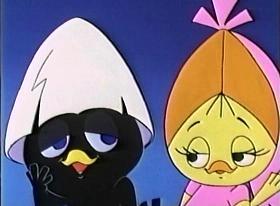Calimero (partially found original Japanese version of anime series; 1974-1975): Difference between revisions
No edit summary |
|||
| Line 1: | Line 1: | ||
{{InfoboxLost | {{InfoboxLost | ||
|title=<center>Calimero (1972 Japanese anime series)</center> | |title=<center>Calimero (1972 Japanese anime series)</center> | ||
| Line 8: | Line 7: | ||
'''''Calimero''''' (カリメロ ''Karimero''<sup>?</sup>) is an Italian/Japanese cartoon about a charming, but hapless anthropomorphized cartoon chicken; the only black one in a family of yellow chickens. He wears half of his egg shell still on his head. Calimero originally appeared on the Italian television show ''Carosello'' on July 14, 1962, and soon became a popular icon in Italy. | '''''Calimero''''' (カリメロ ''Karimero''<sup>?</sup>) is an Italian/Japanese cartoon about a charming, but hapless anthropomorphized cartoon chicken; the only black one in a family of yellow chickens. He wears half of his egg shell still on his head. Calimero originally appeared on the Italian television show ''Carosello'' on July 14, 1962, and soon became a popular icon in Italy. | ||
The character has had multiple animated adaptations in Italy, France, and Japan, with one of the rarest being the first Japanese anime series made by Toei Animation, which ran from October 15, 1972, to September 30, 1975 | The character has had multiple animated adaptations in Italy, France, and Japan, with one of the rarest being the first Japanese anime series made by Toei Animation, which ran from October 15, 1972, to September 30, 1975. | ||
Episodes dubbed in European languages as well as in Arabic can be found online, but none of the original Japanese episodes have surfaced, and only the opening and ending sequences are available. Unfortunately, unlike the second anime series made in 1992, there are no known VHS or DVD releases of the 1972 series in Japanese. There were 47 episodes made for the show. | |||
==External Links== | |||
* [http://www.animenewsnetwork.com/encyclopedia/anime.php?id=1234&page=25 A list of 45 of the episodes with Japanese titles.] Retrieved 04 Nov '16 | |||
* [http://www.dailymotion.com/video/xhl03u_%E3%82%AB%E3%83%AA%E3%83%A1%E3%83%AD-op-ed-hd_shortfilms The opening and ending of the original Japanese episodes.] Retrieved 04 Nov '16 | |||
[[Category:Lost audio]] | [[Category:Lost audio]] | ||
[[Category:Lost animation]] | [[Category:Lost animation]] | ||
[[Category:Lost TV]] | [[Category:Lost TV]] | ||
[[Category:Partially found media]] | |||
Revision as of 02:04, 13 December 2017
Calimero (カリメロ Karimero?) is an Italian/Japanese cartoon about a charming, but hapless anthropomorphized cartoon chicken; the only black one in a family of yellow chickens. He wears half of his egg shell still on his head. Calimero originally appeared on the Italian television show Carosello on July 14, 1962, and soon became a popular icon in Italy.
The character has had multiple animated adaptations in Italy, France, and Japan, with one of the rarest being the first Japanese anime series made by Toei Animation, which ran from October 15, 1972, to September 30, 1975.
Episodes dubbed in European languages as well as in Arabic can be found online, but none of the original Japanese episodes have surfaced, and only the opening and ending sequences are available. Unfortunately, unlike the second anime series made in 1992, there are no known VHS or DVD releases of the 1972 series in Japanese. There were 47 episodes made for the show.
External Links
- A list of 45 of the episodes with Japanese titles. Retrieved 04 Nov '16
- The opening and ending of the original Japanese episodes. Retrieved 04 Nov '16
